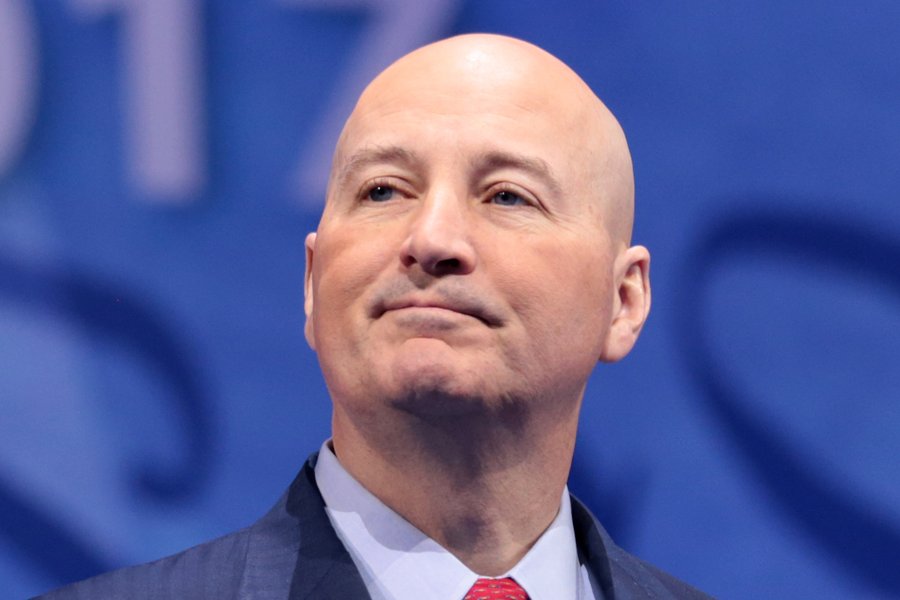Although The Cornhusker Guardian does not endorse the bulk of his philosophical and theological positions, it finds Aldous Huxley’s predictions and analyses with respect to our current age to be eerily prescient.
Justus R. Hope, a physician, writer and human rights advocate, describes an amazingly prophetic 1959 interview that Mike Wallace did with Huxley just four years before his death. We think our readers will find this piece quite interesting.
The Dictatorship of the Future – Aldous Huxley’s Interview
by Justus R. Hope • August 14, 2022
Aldous Huxley, the prophetic author of Brave New World, died on the same day as President John F. Kennedy – November 22, 1963. Unfortunately, Huxley also passed away on the same day as author C.S. Lewis.
Because of this, news reports of both C.S Lewis and Aldous Huxley fell into the shadows of the President’s assassination. This coincidence prompted the writing of a book, Between Heaven and Hell, which discussed the imaginary dialogue between the three leading intellectuals somewhere in purgatory on their journey to places beyond.
“If you want to preserve your power indefinitely, you have to get the consent of the ruled, and this they will do partly by drugs – that I foresaw in Brave New World – partly by these new techniques of propaganda – they will do it (not by force) by bypassing the rational side of man, by appealing to his subconscious and deeper emotions, and even his physiology. And so (by) making him actually love his slavery.”
While Peter Kreeft’s book focuses on the debate between the three men and their differing views on religion, I see this more as the three voicing agreement that the world is headed for a totalitarian takeover, with Huxley leading the discussion. Huxley explains to Kennedy that the greatest threat is not from the Soviet Union but from within our nation. And Huxley agrees with Lewis that totalitarianism violates natural law – God’s law.
“I think the dictatorship of the future will be very unlike…the immediate past,” said Aldous Huxley in his 1959 interview with 60 Minutes Personality Mike Wallace.
“If you want to preserve your power indefinitely, you have to get the consent of the ruled, and this they will do partly by drugs – that I foresaw in Brave New World – partly by these new techniques of propaganda – they will do it (not by force) by bypassing the rational side of man, by appealing to his subconscious and deeper emotions, and even his physiology. And so (by) making him actually love his slavery. This is the danger, that in some ways people may be actually happy under the new regime. But they will be happy in a situation where they oughtn’t to be happy [10:51].”
Without hesitation, Huxley says yes, it could: “[12:00] I think it could. That’s why I feel it’s so EXTREMELY important here and now to start thinking about these problems, not to let ourselves be taken by surprise by these new advances in technology. For example with regard to the use of the drugs…to foresee the kind of uses, and attempt to forestall this. In the same way, with these other methods of propaganda, we can foresee and we can do a good deal to forestall.”
Huxley reminds us, “[12:50] The price of freedom is eternal vigilance.”
Aldous Huxley explains that the real danger is propaganda, “And this is rather alarming; we are being persuaded below the level of choice and reason [15:25] .”
“[16:00] Democracy depends on the voter making an intelligent and rational choice for what he regards is an enlightened self-interest…but what the dictatorial propagandists are doing is to try to bypass the rational side of men, and to appeal directly to these unconscious forces below the surface so that you are in a way making nonsense of the whole democratic procedure which is based on conscious choice or on rational ground.”
Huxley describes how the easiest targets of such propaganda are the children.
Just as the children become the most loyal brand buyers in response to advertisements, they become the most loyal ideology buyers when it comes to indoctrination – as in our schools. Extreme left-wing or Marxist agendas like Critical Race Theory are standard in elementary schools and now extend to universities like Harvard and Yale.
“[17:08] The children are quite clearly much more suggestible than the average grown-up, and again suppose that all of this propaganda was in the hands of one or very few agencies, you would have an extraordinarily powerful force playing on these children who are going to grow up and be adults quite soon.”
Just as the children become the most loyal brand buyers in response to advertisements, they become the most loyal ideology buyers when it comes to indoctrination – as in our schools. Extreme left-wing or Marxist agendas like Critical Race Theory are standard in elementary schools and now extend to universities like Harvard and Yale. General McInerney has recently warned they exist at the service academies like West Point and Annapolis.
Aldous Huxley warned us in 1959 as he explained to Mike Wallace, “[17:52] You can read in the trade journals the most political accounts of how necessary it is to get hold of the children because then they will be loyal brand buyers later on, but I mean again, you just translate this into political terms, the dictator says they will be loyal ideology buyers when they’re grown-up.”
Mike Wallace asks the critical question of how we can prevent the march toward totalitarianism and how we can reassert the value of the human individual [20:50].
Huxley answered that our defense lies in education and critical thinking. We must inform and educate people that the group is not more important than the individual and that freedom and Liberty stand for protecting the rights of each of us.
“[12:43] Every human being is unique and it is on the genetic basis that the whole idea of the value of freedom is based (on this) and I think its extremely important for us to stress this in all our educational life – and I would also say it very important to teach people to be on their guard against the sort of verbal booby traps into which they’re always being led – to analyze the kind of things that are being said to them.”
Huxley further explains that decentralizing power is another answer. He cites Thomas Jefferson, the author of the Declaration of Independence.
Wallace plays devil’s advocate and asks Huxley if freedom is necessary [24:00]. The answer is that it is essential for productivity.
“[24:15] Yes, I should say it is necessary for a genuinely productive society. I mean, I think you could produce plenty of goods without much freedom, but I think the whole sort of creative life of man is ultimately impossible without a considerable measure of individual freedom, initiative, creation, and all these things that we value and all these things that we value properly are impossible without a large measure of freedom.”
Wallace challenges Huxley and points out that the Soviet Union of 1959 seemed to defy his statement that they seemed to produce good science and art. However, Huxley explained that the Soviets had given their best and brightest more freedom to spark that creativity and production, while the overwhelming majority of their people subsisted with little.
“[25:24] The scientists who are doing the creative work are given far more freedom than anybody else – I mean it’s a privileged aristocratic society in which provided they don’t poke their noses into political affairs, these people are given a great deal of prestige, a considerable amount of freedom, and alot of money. I think what we’re going to see is a people as a whole with very little freedom but with an oligarchy on top enjoying a considerable measure of freedom and a very high standard of living – and the Epsilon’s down below – drawing very little.”
Huxley concluded the interview with his statement that we should strive to retain Democracy as it provides freedom and creativity among the elite scientists and offers it to the ordinary citizen.
Aldous Huxley projected his Brave New World to be 600 years in the future when the book debuted in 1932; however, we are quickly arriving there in less than 100. “By 2030, you will own nothing and be happy.”
Huxley feels that drugs will make this feasible because with certain medications or injections – changing a person’s state of mind becomes possible, and the human (or transhuman) may be drugged into not only surrendering but enjoying being subjugated.
Huxley sheds more light on this point, “[8:45] This is a very interesting subject. In this book of mine, Brave New World, I postulated a substance called soma which was a very versatile drug. It would make people feel happy in small doses, it would make them see visions in medium doses and it would send them to sleep in large doses. Well, I don’t think such a drug exists now, nor do I think it will ever exist but we do have drugs which will do some of these things. And I think it’s quite in the cards we may have drugs which will profoundly change our mental states without doing us any harm and this is the pharmacological revolution which has taken place that we now have powerful mind-changing drugs.”
Huxley contrasts his book, Brave New World, with one written by his former student George Orwell (aka Eric Arthur Blair); that book is Nineteen Eighty-Four. Orwell’s book differs in that it describes control by keeping citizens in a constant state of terror and war. Such heavy-handed control is not what Huxley envisions in our coming totalitarianism.
Huxley explains that the new totalitarian regime will not rule by force or terror but instead will control using psychological-driven propaganda and drugs to trick the citizens into giving up their freedom while happily distracting themselves with drugs and technology. Think CNN, NBC, Facebook, Twitter, Cell Phone Tweets, and Cannabis.
“[11:14] They will do it by bypassing the rational side of man and appealing to his subconscious and deeper emotions and his physiology even. And so (by) making him actually love his slavery. This is the danger, that in some ways people may be actually happy under the new regime. But they will be happy in a situation where they oughtn’t to be happy [10:51].”
After the interview, a young Mike Wallace posed a disturbing question. It involved the recognition that Huxley had correctly predicted a totalitarian Soviet government. Still, the burning question was whether Huxley would be correct that the United States would also fall to a World totalitarian government.
“Aldous Huxley finds himself these days in a peculiar and disturbing position. A quarter of a century after prophesying an authoritarian state in which people were reduced to ciphers, he can point at Soviet Russia and say I told you so. The crucial question now is whether the so-called free world is going to give Mr. Huxley the further dubious satisfaction of saying the same thing about us [27:00].”
What remains astonishing is the accuracy of Huxley’s vision written almost 90 years ago that we now see unfolding before our eyes. How could he have known? What was it about the technology in 1959 that alerted him that our own government would ultimately use technology to enslave us?




